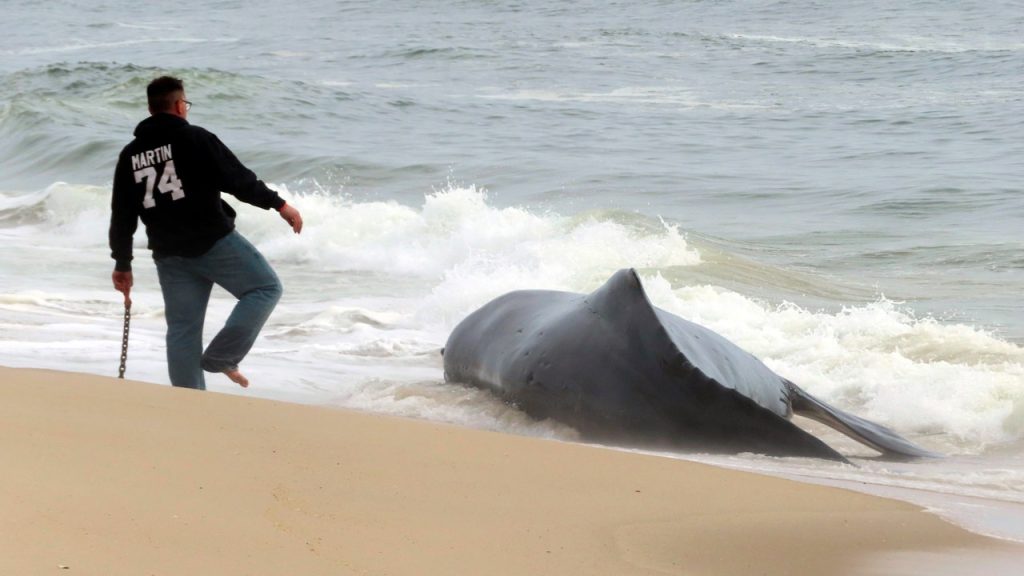A dead humpback whale washed ashore on New Jersey’s Long Beach Island, marking the first such death in the state for the year. The Marine Mammal Stranding Center received a call reporting the whale in the surf in Long Beach Township, describing it as being 20 to 30 feet long. Details about potential causes of death, such as injury or illness, have not been released. This incident follows 14 whale deaths in New Jersey during the previous year, raising concerns about the wellbeing of marine mammals in the region. The National Oceanographic and Atmospheric Administration did not provide information on the whale death or similar fatalities along the U.S. East Coast in recent months.
The dead humpback whale on Long Beach Island has sparked renewed outcries from opponents of offshore wind projects, who believe that site preparation activities for wind farms in the ocean may harm or kill whales. Despite numerous scientific agencies refuting this claim, groups like Protect Our Coast NJ remain skeptical and alarmed by the recent whale deaths. The group expressed concerns that offshore wind companies using sonar sparkers and seismic devices could be disrupting communication patterns of marine mammals, leading to disorientation and potentially contributing to death. The group’s president, Robin Shaffer, questioned the official statements made by scientists attributing whale deaths to ship strikes or entanglements with fishing gear.
Agencies such as the U.S Bureau of Ocean Energy Management, the Marine Mammal Commission, and the New Jersey Department of Environmental Protection have all noted that there is no evidence linking whale deaths to offshore wind preparation activities. Despite these assurances, Protect Our Coast NJ and other critics continue to question the potential impacts of offshore wind development on marine life. The ongoing debate surrounding the cause of whale deaths in New Jersey highlights the complex and contentious issues surrounding environmental conservation, offshore energy development, and the protection of marine species.
The whale death on Long Beach Island raises concerns about the health and safety of marine mammals in New Jersey and along the U.S. East Coast. As the first whale death in the state for the year, the incident has prompted calls for further investigation and research into potential factors contributing to these fatalities. While some groups blame offshore wind projects for harming whales, scientific agencies have repeatedly stated that there is no direct evidence linking wind farm activities to marine mammal deaths. This disagreement underscores the ongoing debate between environmental advocates and industry proponents over the impact of renewable energy development on wildlife.
The lack of clear consensus on the cause of whale deaths in New Jersey underscores the complexity of understanding and mitigating threats to marine life. While some groups point to offshore wind projects as a potential factor in whale fatalities, others emphasize the need for additional research and data to determine the root causes of these deaths. As agencies like the National Oceanographic and Atmospheric Administration remain silent on the issue, the urgency of addressing these concerns and protecting marine mammals becomes increasingly apparent. Collaborative efforts between scientists, conservationists, and industry stakeholders may be necessary to develop effective strategies for safeguarding marine species in the face of environmental and human pressures.
The controversy surrounding whale deaths in New Jersey highlights the interconnectedness of environmental issues, renewable energy development, and wildlife conservation. By engaging in constructive dialogues and evidence-based research, stakeholders can work towards solutions that balance the need for sustainable energy sources with the imperative of protecting vulnerable marine species. While the causes of whale deaths remain under investigation, the importance of preserving the health and diversity of ocean ecosystems must not be overlooked. Finding common ground and fostering cooperation between different interest groups will be essential in addressing the complex challenges facing marine conservation and offshore energy development.


